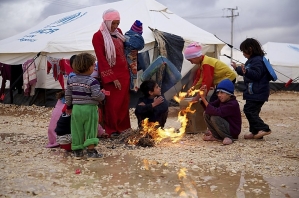
A group of Eastern Christian leaders met in Lebanon to address the situation of Christian refugees in the Middle East and call on the international community to stop supporting terrorism.
According to Paul Dakiki of AsiaNews, the meeting of the Patriarchs and Christian leaders of the East took place Tuesday in Bkerke, Lebanon. Patriarch Beshara Rai told Dakiki that one of their goals was to study the plight of Christian refugees and those who decided to stay in their country in spite of difficulties and war.
"For them, it is urgent to help them secure a job, schools, [and] housing so they can stay in their respective communities and preserve their Christian mission and mission," Rai said.
Dakiki reported that the group made an appeal "to the two communities, Arab and international" to help the refugees.
Charities and nongovernmental organizations have stepped up to help displaced people in the Middle East. According to Dale Gavlak of Catholic News Service, religious minorities in Iraq such as the Yezidis are being helped with blankets, heaters, and kerosene canisters provided by Catholic Relief Services (CRS) and Caritas.
"We're so grateful for this help from CRS and Caritas," Salim, a 34-year-old Yezidi man, said.
Before the help and food parcels arrived, Gavlak noted that Salim, who has a family of eight people including his elderly mother, lacked the means to stay warm in nightly temperatures that dropped to freezing point.
Gavlak reported that thousands of Iraq's religious minorities were displaced by ISIS militants last summer. The majority of them reside in the northern Kurdish region, many left homeless and penniless in the face of inclement winter weather.
Salim elaborated on the brutality that ISIS militants used against the minority groups to Catholic News Service.
"When the militants came, many young women were taken as slaves, while Yezidi men were forced to convert to Islam or be killed," Gavlak wrote, citing Salim. "His family managed to buy back a couple of their relatives for $800 piece, but several uncles have not been heard from since."
CRS Iraq country representative Hani El-Mahdi told Gavlak that the surrounding mountainous region in northern Iraq hosted about 450,000 displaced Christians, Yezidis, Shiite Muslims, Shabaks and Kaka'i people. The United Nations estimated that there are 800,000 displaced Iraqis in the entire Kurdish region.
Gavlak reported that the majority of refugees lived in tents. Some, like Salim, lived in unfinished buildings scattered throughout Kurdistan.
"Rain often comes inside because the building is a bare concrete shell," Salim said. "The owners have run out of funds to complete it."
According to Gavlak, CRS has been installing insulated windows and doors in more than 400 unfinished buildings. In return, the organization gets permission from both owners and municipalities to allow displaced people to live in the buildings for two consecutive winters.
"The cost is cheaper than buying a tent or any other alternative solution for them by far," El-Mahdi said.
El-Mahdi added that installation costs are lower than keeping refugees in camps or paying rent on completed buildings. He told Gavlak that everyone wins with this solution.
"People prefer this. It's much more dignified, safe and protected than putting them in camps," he said. "It's a win-win relationship for everybody."
CRS regional director for Europe and the Middle East Kevin Hartigan told Catholic News Service that the funds for the "cash assistance" they give to displaced people come from "private funds." Although he acknowledged that there is some funding from the governments of Canada and the United States, the relief efforts largely run on donations.
"The shelter work is funded by the U.S. and Canadian governments," Hartigan said. "The cash assistance is from private Catholic family donations, money from special collections in September and other gifts from our supporters in the U.S."
Despite all the assistance that has arrived to help displaced Iraqi minorities, Hartigan contended that more work still needs to be done.
"I'm struck again by the enormity of the crisis and still-unmet need," Hartigan said. "We realize, along with our peer agencies and the rest of the humanitarian community, the need to continue to scale up and expand our capacities and work as well as helping the local church to build its capacity as we try to continue assistance with shelter, water and sanitation. More importantly, we look forward to supporting education for displaced children."
In an optimistic tone, Hartigan said that current aid efforts have borne fruit in the region. Gavlak reported that Hartigan visited Iraq in July and September, during the height of ISIS throwing out Christians and other religious minorities.
"To see the change we've been able to bring about in some of these communities, particularly the shelter the people have for winter, is wonderful," he said.







